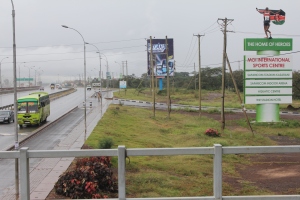An Ethiopian refugee family barely escaped the deportation scheme but their teenage son got deported to Somalia.
On Saturday night the 5th of April 2014 at about 8 pm a family who were leaving the Madina Hospital in Nairobi after attending to a sick family member were suddenly stopped and arrested by police. Despite demonstrating their identity a group of three people from the same family were arrested. The family were driven in a police van and detained at Shauri Moyo police station where they spent a night in a dirty cell.
This action was part of the police swoops which followed the Kenyan government’s Usalama Watch initiative, that was believed to target illegal migrants. The refugees were greatly victimized in the crackdown. The Somali community strongly believe that the operation was meant to target their establishment in Kenya.
On the 6th April at around 2 pm the family were taken to Kasarani Stadium where they underwent a harsh screening process. The family, compromising a mother and two of her sons, were forcefully alleged to be Somali nationals while they were in fact Ethiopians.
Shukri Mohamud Muawye – 52, Abdikadir Mohamed – 25 and Ahmed Mohamed – 18 were all detained in the same cell at Kasarani. They were threatened with deportation despite possessing refugee documents.
Shukri had her alien identification card issued by the Kenyan government but the police dismissed her alien ID as invalid. Ahmed Mohamed only had expired refugee papers with him when they got arrested. Therefore, he was regarded as an “Illegal Migrant” and immediately threatened for deportation.
The same night Shukri was separated from her two sons and taken to Pangani Police station. The two brothers remained detained at Kasarani.

On the 7th April at about 2 pm, Shukri was returned to Kasarani Stadium in lorry full of Somalis, the majority being women and children. Abdikadir who spoke with KANERE describes his bitterness at the danger posed to him and his family by this mistaken nationality among other threats they suffered. “We’re Ethiopian refugees, we’re not Somali and we’re not terrorists. We had proof of our identities but there’s even no law that protects us.”
In interview Abdikadir stated that he had UNHCR papers with him and got released after paying Kenyan shilling 10,000 (equivalent to $150) to the police officials at the Kasarani Stadium. However, the bribe did not stop the deportation of his younger brother to Somalia.
On the same evening, Abdikadir describes that his mother and many other detainees were forced into a lorry and taken to an unknown destination. Later on Abdikadir learned that his mother was detained at Gigiri Police Station where she spent two nights in a packed police cell.
On Wednesday afternoon 9th April, Ahmed Mohamed was forced on a plane together with 87 other people and deported to Somalia. Ahmed showed his UNHCR and government of Kenya travel document which had expired some months before but he was not listened to by any officials during the screening process.
According to Abdikadir, on the 10th April his mother and many Somalis were taken back by lorry to Kasarani for re-screening. On that day, the detainees were kept inside the lorry which had brought them in the hot sun in the stadium for many hours. After what he said was exclusive screening, Abdikadir’s mother was among the Somali women and children who were taken to Embakasi police station, where she was locked up until 14th April.
Shukri spent at least 16 days in the police cells and was not brought to any court of law for any offence committed. She had the UNHCR Mandate and the government issued alien identification documents but she was never given any chance to express herself.
The planned deportation of Shukri was thwarted when Human Right Watch visited Embakasi and Kasarani Stadium to verify the situation of registered refugees who are about to be deported. On the 17th April, Abdikadir was re-united with his mother while Ahmed was deported to Somalia.
In the wake of the police crackdown at least five Ethiopian refugees were deported to Somalia. Between April and June, the government of Kenya deported at least 480 Somalis, of whom the majority were believed to be illegal immigrants. Many illegal migrants who wish to claim refuge in Kenya were not given the opportunity to register.
Since the operation Usalama Watch was launched, refugees have been arrested and held in different parts of the urban detention facilities. Kasarani is a new concentration center where for many months screening and deportation issues have been sorted out by a special unit of Kenyan security.
According to the 1951 Geneva Convention relating to the status of refugees, international law forbids the refoulement of foreigners who have a fear of death upon return to the country of origin. However, while Kenya is signatory to above principle and has passed the Kenyan Refugee Act of 2006 into domestic law, the concerned ministry has failed the refugees.
The Department for Refugee Affairs within the Ministry of State for Immigration in coordination with the Ministry for Home Affairs are required to be more effective in managing the refugees and asylum seeking process within Kenya’s borders.
